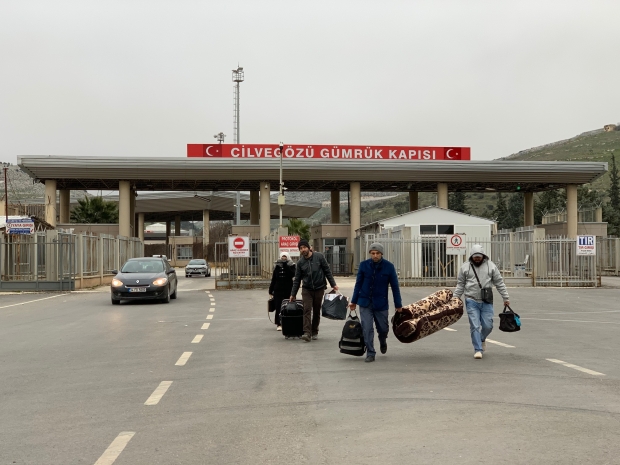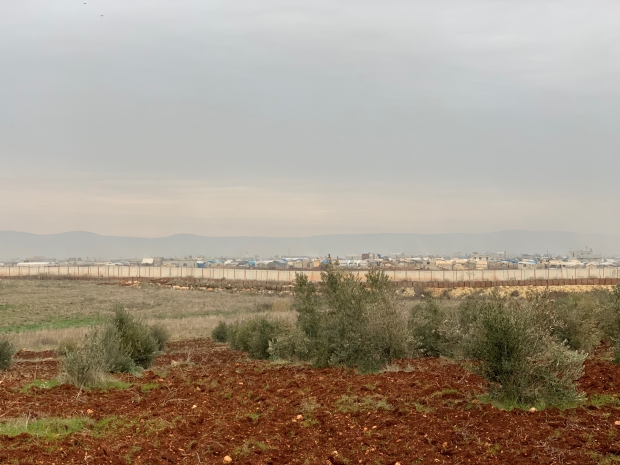'We don't want even five Syrians': Turkey reaches limits on Idlib's refugees

Hundreds of thousands of Syrian refugees have been camped out near the Turkish border with Syria since December - but there are no signs Turkey will allow them to cross over in the event of a Syrian government attack on the northwestern city of Idlib.
In the Turkish border town of Reyhanli, in a small district already struggling with around 100,000 internally displaced Syrians, no state aid agencies are making preparations for the possible influx of refugees, which could push as many as two million people towards the border.
Since late last year, Turkish Interior Minister Suleyman Soylu has repeatedly said that Ankara did not have any plans to take more refugees, since it was already hosting about four million, the highest number in the world.
Local officials, such as the mayor of the border city of Hatay and opposition CHP party member Lutfu Savas, agrees with Soylu. “Psychologically and economically, we aren’t in a position to carry a new wave of Syrian refugees,” he said earlier this week.
A poll released by Kadir Has University in Istanbul last month indicated that nearly 60 percent of Turkish people are unhappy with the presence of Syrian refugees.
New MEE newsletter: Jerusalem Dispatch
Sign up to get the latest insights and analysis on Israel-Palestine, alongside Turkey Unpacked and other MEE newsletters
A Turkish source close to the government administration in Hatay, who has closely followed the war since 2011, said that Turkey would not even want to accept five more people into the country.
“They would only take some heavily wounded people. And treat them, and send them back. That’s it,” the source said.
Renting olive trees
Meanwhile, the situation on the ground in the Idlib province is grim. The latest data from the UN says more than 800,000 Syrians have been displaced in the province since 1 December.
While around half a million preferred to stay in the district, 250,000 of them fled to relatively safer areas in northern Aleppo, such as Afrin, Azaz and al-Bab, which are under direct Turkish control.
'It is horrific what people are facing'
- Mark Cutts, UN Deputy Regional Humanitarian Coordinator
About 82,000 people are living in open areas, including under trees. Aid workers told Middle East Eye that due to a lack of space for incoming refugees, some farm owners had even started to rent out olive trees as properties. The price depends on the location, with some going for $1 a month and others renting for as much as $50.
UN Deputy Regional Humanitarian Coordinator for the Syria Crisis Mark Cutts said that the organisation does not have enough time to build new camps as thousands of people arrive in the area every day.
“It is horrific what people are facing," he told MEE. “It takes time to create new camps. It takes a lot of infrastructure work, gravelling, because it is muddy. And you need water and sanitation facilities.”
With temperatures dropping below zero degrees celsius in the area, conditions are only going to get worse.
There have been attempts to build temporary briquette housing by Turkey's government and Turkish humanitarian aid organisations such as IHH.
Selim Tosun, the media coordinator for IHH’s Syria operations, said space to build new camps in Idlib had almost run out.
“Literally, there is no space left for tents. The rest is prone to be flooded or not viable. That’s why we are trying to build 10,000 briquette houses. They are more stable,” he told MEE.
The Turkish Red Crescent and Disaster and Emergency Management Presidency (AFAD) are hurrying trucks loads of aid to the camps every day.
Tosun said it was almost impossible to help everyone. "We are currently directly aiding more than 30,000 people," he said.
"I believe the Turkish government is doing even more than its capacity. But we are talking about millions of people. How could you help all of them?”
For the last two weeks, the Turkish military has been deploying hundreds of tanks, howitzers, armoured vehicles and commandos to Idlib.
Several sources on the ground suggest that the military is trying to create a security wall just 6km outside the city to block a Syrian government offensive backed by the Russian air force.
A US official who spoke to MEE on condition of anonymity said that lack of preparations in Hatay for a refugee wave and the strong military presence indicated that Turkey was serious about holding the line in Idlib. “Clearly they are ready to defend the civilians,” the official said.
However, a lack of Turkish air support for a military operation due to Russian air defence systems and Moscow's apparent willingness to go all the way to the border may create conditions never seen before in Syria since the beginning of the war in 2011.
In the case of a complete Syrian takeover of Idlib, there appear to be only two scenarios for the refugees.
Tosun believes some refugees will not leave and try to live under Syrian government control, while others could continue to emigrate to Afrin and al-Bab.
However, several individuals with knowledge of Afrin said it was already too crowded and any further flow of refugees could destabilise the area.
“That area itself, there have been a number of security incidents recently, there were two car bombs in Afrin city in the last few days,” Cutts said. “There has been a bombing in al-Bab. People are feeling that nowhere is safe for them at the moment.”
The second scenario is opening the border gates and taking some of the refugees into Turkey. “They (Turkey) don’t want to see more refugees coming into the country,” Cutts said.
Yet several locals said they were willing to harbour more refugees. Burhan Yigit, a local shopkeeper in his fifties, said that he could not personally ignore the plight of refugees.
“I pity the women and children. They are humans, and if they have got nowhere to go, we have to take them,” he told MEE.
Oytun Orhan, an expert specialising in Syrian affairs at the Ankara-based think-tank ORSAM, said that there were empty camps in Turkey that could host some of the refugees.
“Around 100,000 people could be hosted in the camps scattered in the region from Maras to Hatay, which were previously abandoned,” he told MEE.
But with camps such as Atme located next to the Turkish border in Syrian territory, hosting possibly hundreds of thousands of people, the prospect looks extremely bleak.
Middle East Eye delivers independent and unrivalled coverage and analysis of the Middle East, North Africa and beyond. To learn more about republishing this content and the associated fees, please fill out this form. More about MEE can be found here.






